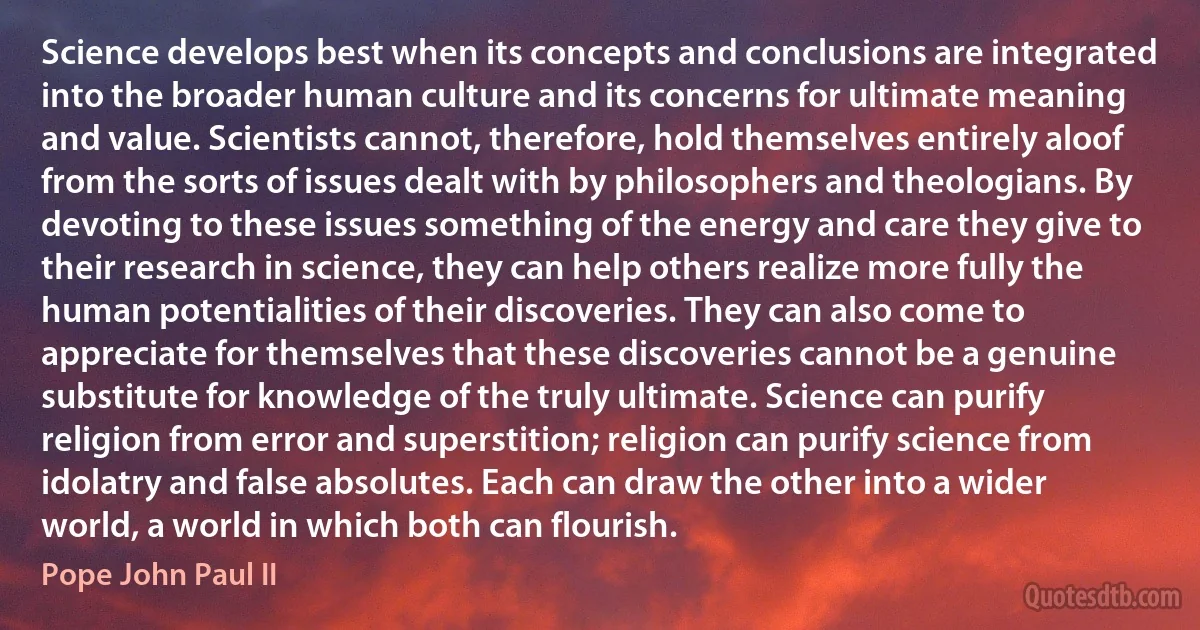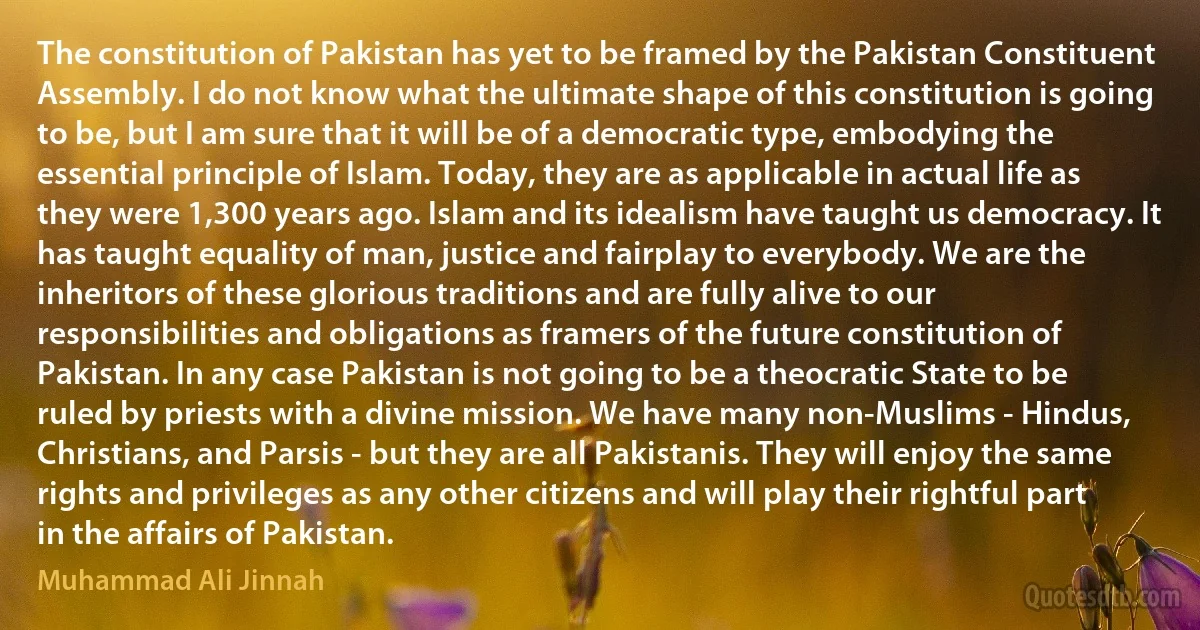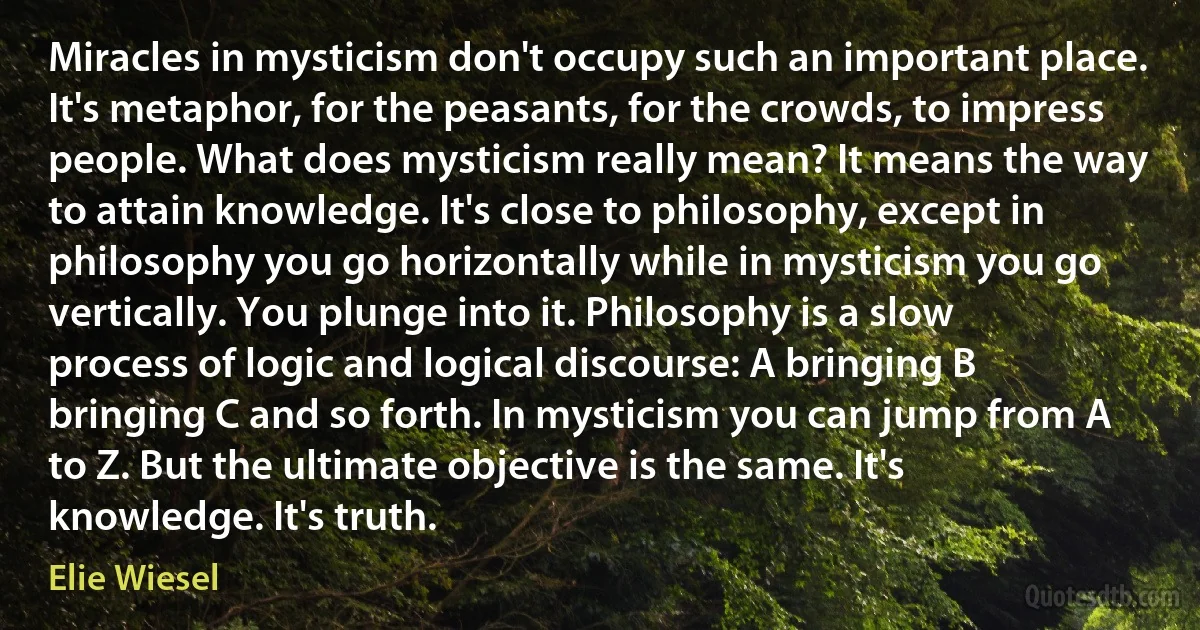Ultimate Quotes - page 56
Mr. President, today, we celebrate the birthday of a giant, Ronald Reagan. America is indebted to President Reagan for reviving our national spirit and ensuring that we prevailed in that "long twilight struggle" against soviet totalitarianism. His leadership not only revitalized our economy, but gave us a rebirth of patriotism and national greatness. My fellow Vietnam Prisoners of War share a special affection for Ronald Reagan. Word of his steadfastness against aggression even reached us in our cells thousands of miles away from freedom. When we were released, he befriended and supported us. He understood and appreciated the "noble cause" for which so many brave Americans made the ultimate sacrifice. Today, America enjoys unprecedented peace and prosperity largely due to the policies of Ronald Reagan. So, to celebrate your 90th birthday, we salute you President Reagan, a brave soldier in the battle for freedom.

John McCain
[T]he daimonic power does not merely take the individual over as its victim, but works through him psychologically, it clouds his judgment, makes it harder for him to see reality, but still leaves him with the responsibility for the act. This is the age old dilemma of my own personal responsibility even though I am ruled by fate. It is the ultimate statement that truth and reality are psychologized only to a limited extent. Aeschylus is not impersonal but transpersonal, a believer in fate and moral responsibility at the same time.

Rollo May
Without even entering into the question of the world economy's ultimate dictation within narrow limits of everybody's productive activity, it's apparent that the source of the greatest direct duress experienced by the ordinary adult is not the state but rather the business that employs him. Your foreman or supervisor gives you more or-else orders in a week than the police do in a decade.

Bob Black
Only through the group, I realised - through sharing the suffering of the group - could the body reach that height of existence that the individual alone could never attain. And for the body to reach that level at which the divine might be glimpsed, a dissolution of individuality was necessary. The tragic quality of the group was also necessary, the quality that constantly raised the group out of the abandon and torpor into which it was prone to lapse, leading it to an ever-mounting shared suffering and so to death, which was the ultimate suffering. The group must be open to death - which meant, of course, that it must be a community of warriors.

Yukio Mishima
Fate toyed with Teddy Kennedy. He was rich. He was famous. He was powerful. Yet he controlled so little. He drank too much, ate too much, risked too much, and did not have the imagination to ever question a liberalism that desperately needed updating. Ultimate success eluded him; tragedy and failure enriched him - a life's journey that took him from being his father's youngest son to his very own man. He was born a Kennedy, but he died just one of us.

Ted Kennedy
An experiment was in progress to ascertain if ordinary culture had attained a stage at which it would appreciate a flood of new thought relating to a science loftier than any dealing exclusively with phenomena perceptible to the physical senses, and in connection with that experiment I was privileged to receive a considerable volume of information relating to the early history of mankind millions of years antedating the range of historical record; also to the concatenation of worlds and the ultimate destinies of our own. Though crude and incomplete, this preliminary sketch of occult science and of the agency through which, though unknown to the multitude, the purpose of creation was being worked out on the physical plane, thrilled the readers of the message all over the civilized world to an extent which gave rise to an organization, the Theosophical Society, which now covers Great Britain, Europe generally, and the United States of America with innumerable branches.

Alfred Percy Sinnett
There is a peculiarly modern predilection for psychological explanations of disease, as of everything else. Psychologizing seems to provide control over the experiences and events (like grave illnesses) over which people have in fact little or no control. Psychological understanding undermines the "reality" of a disease. That reality has to be explained. (It really means; or is a symbol of; or must be interpreted so.) For those who live neither with religious consolations about death nor with a sense of death (or of anything else) as natural, death is the obscene mystery, the ultimate affront, the thing that cannot be controlled. It can only be denied. A large part of the popularity and persuasiveness of psychology comes from its being a sublimated spiritualism: a secular, ostensibly scientific way of affirming the primacy of "spirit" over matter.

Susan Sontag
We ought to recognize that uncertainty of mind is not all a bad thing. It is a sign that your mind is still alive, still sensitive. If you are not at all confused in this day you are dead mentally and spiritually.
There is of course the peace of the cemetery. If you want that you can have it. But you will pay for such complacent serenity with blind eyes which do not see the world's fear and agony; with deaf ears, into which the still sad music of humanity never comes; with deadened nerves and unsensitized conscience.
We will never be brought to confusion, even in such a baffling and muddled world as ours, if we have a faith in a God of love as the ultimate power in the universe. The words "God is love" have this deep meaning: that everything that is against love is ultimately doomed and damned.

Halford E. Luccock
To quote computer graphics pioneer Ivan Sutherland who said in 1965: "The ultimate display would, of course, be a room within which the computer can control the existence of matter. A chair displayed in such a room would be good enough to sit in. Handcuffs displayed in such a room would be confining, and a bullet displayed in such a room would be fatal." Sutherland's futuristic vision sounds just like Star Trek's holodeck!

Newton Lee
September of the year 490 B.C. was to my mind a more cardinal moment of fate for Europe than August 1914. Western civilization...was saved in its infancy at Marathon, and ten years later by Leonidas and by the men of Salamis...had it not been for that decade there would have been nothing to prevent Eastern Europe being orientalized and the ultimate fight for the hegemony of Europe would have been left to the Persians and the Carthaginians. But for the Greeks there would have been no civilization as we know it, and we should all have been dark-skinned people with long noses...England is the natural home of liberty and free institutions, and in her endeavour to secure these blessings for the world no country ought to be quicker than she in acknowledging her debt to Hellas.

Stanley Baldwin
The torch I would hand to you, and ask you to pass from hand to hand along the pathways of the Empire, is a Christian truth rekindled anew in each ardent generation. Use men as ends and never merely as means; and live for the brotherhood of man, which implies the Fatherhood of God. The brotherhood of man to-day is often denied and derided and called foolishness, but it is, in fact, one of the foolish things of the world which God has chosen to confound the wise, and the world is confounded by it daily. We may evade it, we may deny it; but we shall find no rest for our souls, or will the world until we acknowledge it as the ultimate wisdom. That is the message I have tried to deliver as Prime Minister in a hundred speeches.

Stanley Baldwin
The documents associated with the United States Constitution seem to indicate that the Masonic founding fathers were a mixed group as far as ultimate goals are concerned. Of course, we can attach little real weight to the words of politicians of any age, for it is primarily posturing. At any rate, it appears to me that agents of tyranny and opponents of tyranny hashed out a compromise that became the U.S. Constitution. Unfortunately, those who compromise with tyrants betray future generations.

David Lane (white nationalist)
Philosophy finds religion, and modifies it; and conversely religion is among the data of experience which philosophy must weave into its own scheme. Religion is an ultimate craving to infuse into the insistent particularity of emotion that non-temporal generality which primarily belongs to conceptual thought alone. In the higher organisms the differences of tempo between the mere emotions and the conceptual experiences produce a life-tedium, unless this supreme fusion has been effected. The two sides of the organism require a reconciliation in which emotional experiences illustrate a conceptual justification, and conceptual experiences find an emotional illustration.

Alfred North Whitehead
When I lost my mother, I thought, there's no point. Everything I have done, I'd done for her. I went to school for her. She gave me no pressure. You know, and it's important for me to say this because, you know, there's a stereotype of the Asian tiger mom. My mother was never such a mother. She said, whatever you want to do, as long as you're happy, you can do it. And worse comes to worst, she points to the desk. She works in a nail salon. She points to the desk beside her. There's always an empty desk in the salon. She says, you can sit down right here, and then we'll work together. So I had ultimate freedom to explore. And I think for me, you know, that freedom really was all to serve her. It was, how do I help my mother get out of the projects? Every immigrant has that dream.

Ocean Vuong
An irresistible passion that would induce me to believe in innate ideas, and the truth of prophecy, has decided my career. I have always loved liberty with the enthusiasm which actuates the religious man with the passion of a lover, and with the conviction of a geometrician. On leaving college, where nothing had displeased me more than a state of dependance, I viewed the greatness and the littleness of the court with contempt, the frivolities of society with pity, the minute pedantry of the army with disgust, and oppression of every sort with indignation. The attraction of the American revolution transported me suddenly to my place. I felt myself tranquil only when sailing between the continent whose powers I had braved, and that where, although our arrival and our ultimate success were problematical, I could, at the age of nineteen, take refuge in the alternative of conquering or perishing in the cause to which I had devoted myself.

Gilbert du Motier, Marquis de Lafayette
What we need in literature today are vast philosophic horizons - horizons seen from mastheads, from airplanes; we need the most ultimate, the most fearsome, the most fearless "Why?" and "What next?"
This is what children ask. But then children are the boldest philosophers. They enter life naked, not covered by the smallest fig leaf of dogma, absolutes, creeds. This is why every question they ask is so absurdly naive and so frighteningly complex. The new men entering life today are as naked and fearless as children; and they, too, like children, like Schopenhauer, Dostoevsky, Nietzsche, ask "Why?" and "What next?" Philosophers of genius, children, and the people are equally wise - because they ask equally foolish questions. Foolish to a civilized man who has a well-furnished European apartment with an excellent toilet and a well-furnished dogma.

Yevgeny Zamyatin
Those, no doubt, are in some way fortunate who have brought themselves, or have been brought by others, to obey some ultimate principle before the bar of which all problems can be brought. Single-minded monists, ruthless fanatics, men possessed by an all-embracing coherent vision do not know the doubts and agonies of those who cannot wholly blind themselves to reality.

Isaiah Berlin



